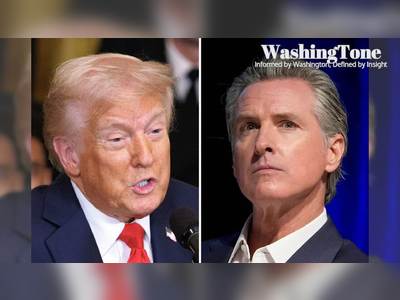White HouseSenateThe HouseSupreme CourtFederal ReserveDOJState DepartmentTreasuryCensusBudget OfficeTrade Representative
WashingTone
Informed by Washington, Defined by Insight
Saturday, Apr 19, 2025
WashingTone
Designed in US, made in China: Why Apple is stuck in tariff tussle
US tariffs on Chinese imports pose a challenge to Apple's manufacturing operations in China, where most of its iPhones are made
The United States and China, the world's two largest economies, have an interdependent relationship that has been disrupted by US President Donald Trump's tariffs on Chinese imports.
Apple, one of the world's most valuable companies, is caught in the middle of this trade dispute.
The company designs its products in California, but most of its iPhones are manufactured in China by partners such as Foxconn.Apple sells over 220 million iPhones annually, with the majority being made in China.
The country is also home to many of Apple's suppliers, with around 150 of its top 187 suppliers having factories in China.
The company's CEO, Tim Cook, has stated that 'there's no supply chain in the world that's more critical to us than China'.However, the Trump administration has imposed tariffs on Chinese imports, including some electronic devices, in an effort to encourage businesses to manufacture products in America instead.
While Apple was initially exempt from these tariffs, the company is still vulnerable to changes in the trade relationship between the US and China.China has benefited significantly from hosting Apple's assembly lines, with the company helping to develop local suppliers into 'manufacturing superstars'.
The country's supply chain is a major draw for foreign manufacturers, and any change to Apple's current supply chain status quo would be a significant blow to China's economy.The US tariffs on Chinese imports have led to retaliatory measures from China, including levies on US imports and export controls on rare earth minerals.
This has created uncertainty for companies like Apple, which rely on global supply chains to manufacture their products.Apple is exploring alternative manufacturing locations, including Vietnam and India, but the majority of its assembly still takes place in China.
The company faces significant challenges in diversifying its supply chain, including the need for specialized labor and infrastructure.The trade dispute between the US and China has also led to increased competition for Apple from Chinese firms such as Huawei, Xiaomi, and Oppo.
These companies are seeking to develop advanced tech manufacturing capabilities, which could potentially reuse Apple's mature supply chain.Apple has announced a $500 billion investment in the US, but it remains to be seen whether this will be enough to appease the Trump administration.
The company is likely to face continued pressure from the ongoing trade dispute, including potential tariffs on smartphones and other electronic devices.
Apple, one of the world's most valuable companies, is caught in the middle of this trade dispute.
The company designs its products in California, but most of its iPhones are manufactured in China by partners such as Foxconn.Apple sells over 220 million iPhones annually, with the majority being made in China.
The country is also home to many of Apple's suppliers, with around 150 of its top 187 suppliers having factories in China.
The company's CEO, Tim Cook, has stated that 'there's no supply chain in the world that's more critical to us than China'.However, the Trump administration has imposed tariffs on Chinese imports, including some electronic devices, in an effort to encourage businesses to manufacture products in America instead.
While Apple was initially exempt from these tariffs, the company is still vulnerable to changes in the trade relationship between the US and China.China has benefited significantly from hosting Apple's assembly lines, with the company helping to develop local suppliers into 'manufacturing superstars'.
The country's supply chain is a major draw for foreign manufacturers, and any change to Apple's current supply chain status quo would be a significant blow to China's economy.The US tariffs on Chinese imports have led to retaliatory measures from China, including levies on US imports and export controls on rare earth minerals.
This has created uncertainty for companies like Apple, which rely on global supply chains to manufacture their products.Apple is exploring alternative manufacturing locations, including Vietnam and India, but the majority of its assembly still takes place in China.
The company faces significant challenges in diversifying its supply chain, including the need for specialized labor and infrastructure.The trade dispute between the US and China has also led to increased competition for Apple from Chinese firms such as Huawei, Xiaomi, and Oppo.
These companies are seeking to develop advanced tech manufacturing capabilities, which could potentially reuse Apple's mature supply chain.Apple has announced a $500 billion investment in the US, but it remains to be seen whether this will be enough to appease the Trump administration.
The company is likely to face continued pressure from the ongoing trade dispute, including potential tariffs on smartphones and other electronic devices.










